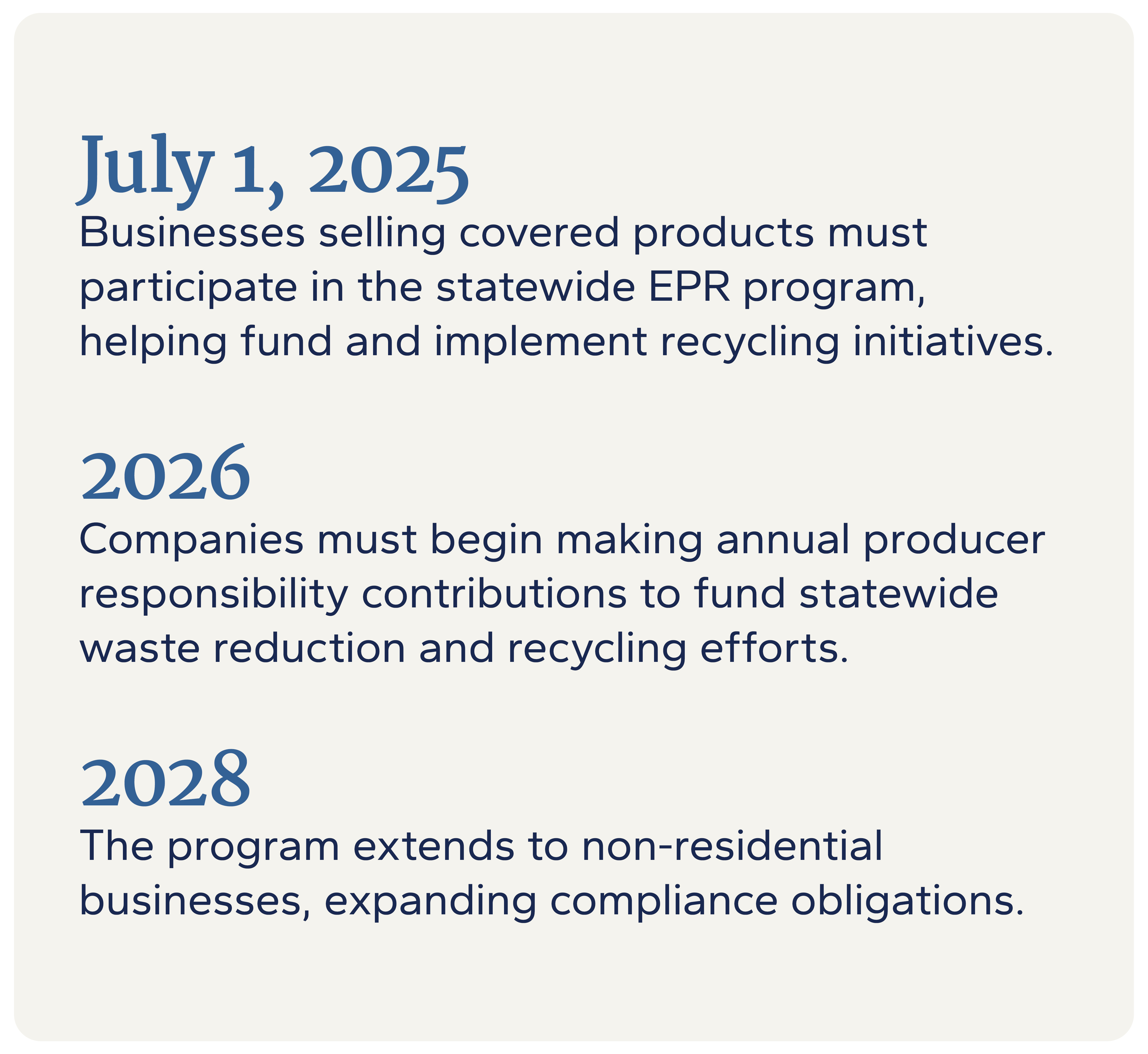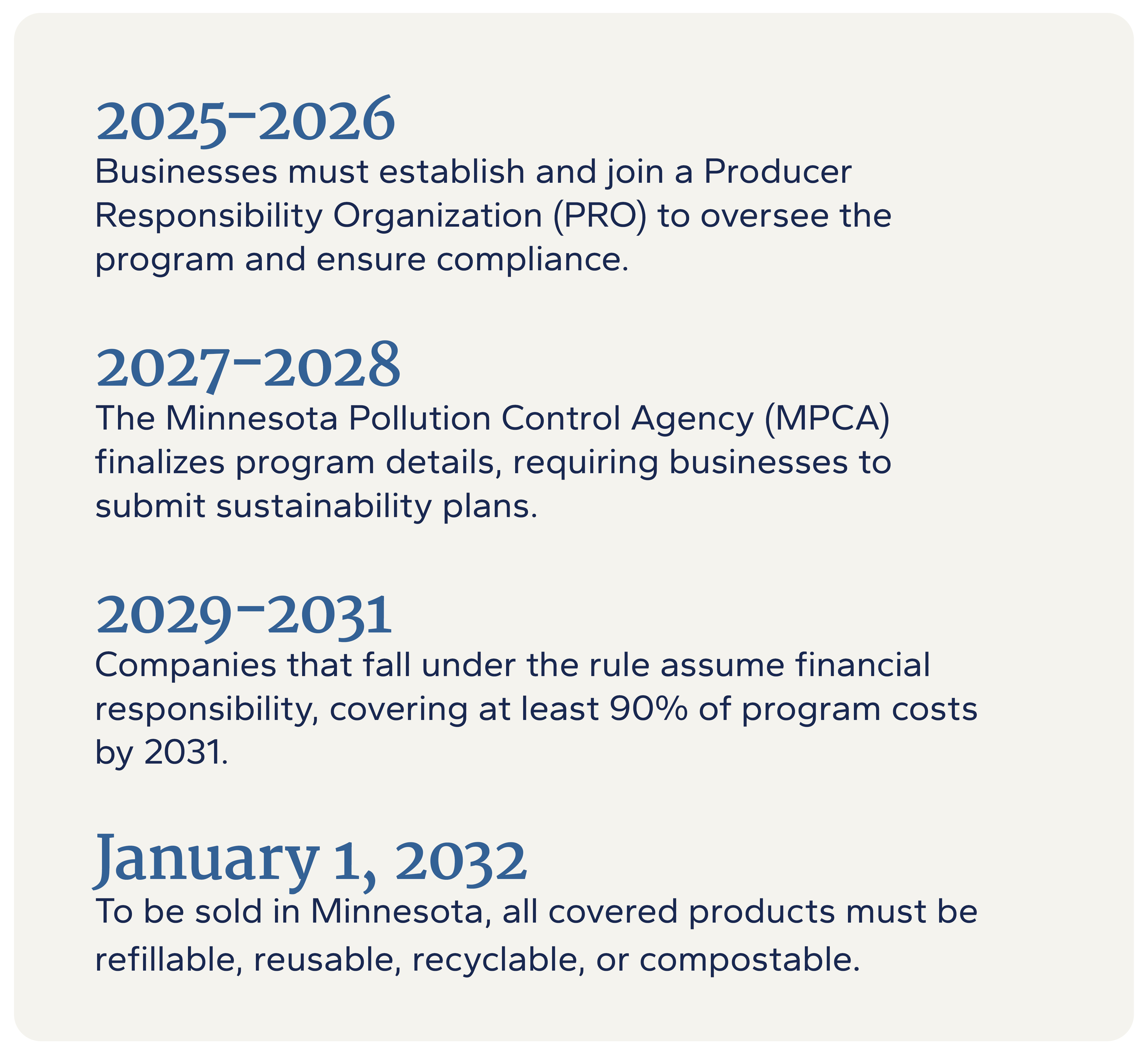Key Takeaways
- State-level EPR laws are expanding, requiring producers to fund and manage recycling efforts — Colorado and Minnesota are leading with distinct timelines.
- Compliance will be complex and state-specific, making proactive planning essential to avoid penalties and support long-term business resilience.
- Businesses must rethink packaging, data tracking, and sustainability strategies to align with EPR mandates and stay competitive in a shifting regulatory landscape.
Extended Producer Responsibility (EPR) laws are gaining momentum across the U.S. These regulations shift the burden of product waste management from consumers and municipalities to the producers themselves. The goal? Reduce landfill waste and drive more sustainable packaging and product design. As more states roll out EPR programs, businesses must be prepared for the evolving landscape — and the potential consequences of non-compliance.
California, Oregon, and Maine have enacted EPR laws, and now Colorado and Minnesota are introducing their own, each with unique requirements and compliance timelines. This shift significantly expands the push for extended producer responsibility nationwide.
EPR Laws in Action: Colorado and Minnesota Lead the Way
Colorado’s Extended Producer Responsibility Program
Colorado’s EPR law (HB22-1355) requires businesses to fund and manage recycling programs, starting July 1, 2025.
This means companies producing or selling packaging materials or paper products must participate in a statewide program to help fund recycling initiatives. By 2026, businesses must also contribute annually to waste reduction efforts. In 2028, the program will extend to non-residential businesses.

Minnesota’s Packaging Waste and Cost Reduction Act
Minnesota’s approach is even broader, with phased requirements from 2025 through 2031.
Companies producing packaging, food packaging, and paper products must join a Producer Responsibility Organization (PRO) and submit sustainability plans. By 2032, all covered products must be refillable, reusable, recyclable, or compostable to be sold in the state.

The Business Implications of EPR Laws
As states push forward with EPR laws, businesses — especially those operating in multiple states — must adjust their product packaging, supply chains, and financial strategies.
Here's what to know:
- Compliance will be complex: With different regulations across states, understanding exactly where your business falls under EPR laws is crucial. Failing to comply can result in fines, reputational damage, and operational inefficiencies. It’s not just about meeting legal requirements but protecting your bottom line and long-term growth.
- Proactive planning is key: EPR laws are evolving, and they’re here to stay. Preparing for these changes means rethinking your product design, waste management strategies, and internal systems to ensure you meet requirements. Proactive businesses can turn this challenge into an opportunity to improve sustainability practices, enhance brand reputation, and reduce waste.
How to Prepare for EPR Regulations
To meet these requirements, follow a structured approach:
- Optimize packaging design: Reduce the use of non-recyclable materials. Incorporating sustainable alternatives isn’t just good for the environment — it’s also good for your regulatory strategy.
- Implement waste management systems: Develop take-back programs or partner with local recyclers to simplify compliance. Some EPR laws require businesses to take direct responsibility for the recycling process — having the right systems in place early on can save you time and money.
- Track your data: States will require reporting and payment of fees based on your materials usage. Keeping accurate records is essential to avoid penalties and streamline the process.
- Work with Producer Responsibility Organizations (PROs): Many states allow businesses to work with PROs to manage compliance. These organizations handle recycling logistics, making it easier for you to meet requirements without adding administrative burden.
Beyond EPR: Other Sustainability Laws to Watch
EPR laws aren’t the only regulations you should be tracking. Other state-level mandates are gaining traction.
These include:
- Polystyrene Foam Bans: California and other states are restricting polystyrene foam, affecting food service businesses that must transition to compliant alternatives.
- Zero-Emission Vehicle (ZEV) Requirements: More states are adopting California’s mandate for automakers to increase the availability of electric vehicles.
- Climate Risk Disclosure for Financial Institutions: Minnesota is leading the way with new rules requiring banks to assess and disclose climate risk. SF 2744 requires financial institutions with more than $1 billion in assets to submit an annual climate risk assessment by July 30.
How to Navigate EPR Laws and Other Sustainability Regulations
With varying state laws shaping the regulatory landscape, businesses should adopt a structured approach to meeting sustainability laws in the U.S.
Here’s where to start:
Identify Applicable Regulations
- Evaluate whether your company is subject to climate reporting laws based on revenue and operational size (e.g., California’s $500M/$1B thresholds).
- Assess state-specific laws affecting your sector, such as polystyrene packaging bans, zero-emission vehicle policies, and EPR rules.
- Review supply chain and distribution networks to determine cross-state obligations.
Establish a Climate Reporting Framework
- Collect Scope 1 and 2 emissions data before expanding to Scope 3.
- Align with recognized frameworks like TCFD and ISSB to ensure consistency.
- Develop an assurance-ready documentation process to meet verification standards.
Ensure Compliance with Extended Producer Responsibility (EPR) Regulations
- Determine whether your company’s products fall under state EPR mandates.
- Develop a packaging and recycling strategy to minimize financial and operational impacts.
Enhance Internal Compliance Capabilities
- Assign a compliance team to stay updated on changing sustainability laws.
- Partner with regulatory experts to interpret complex legal requirements.
- Use compliance management tools to track data, report progress, and be audit ready.
Turn Compliance Challenges into Business Opportunities
State-level sustainability laws are reshaping the business landscape. EPR regulations are just one piece of the puzzle — companies must also keep an eye on climate risk disclosures, packaging bans, and other emerging regulations. The key to success? Proactive, informed action.
We understand the complexity of navigating state-level EPR laws and other sustainability regulations. With our expertise in compliance and sustainability strategy, we can help your business stay ahead of the curve by:
- Assessing your compliance needs: We’ll help you identify which regulations apply to your products and operations.
- Developing a strategic plan: Our team will guide you in optimizing product design, implementing recycling programs, and tracking necessary data to ensure compliance.
- Staying up-to-date: Sustainability laws are evolving quickly. Our advisors are always on top of changes, so you don’t have to be.
At Eide Bailly, we’re committed to providing you with the expertise and tools needed to navigate these changes effectively. Whether you’re adjusting your packaging, enhancing your recycling programs, or managing your climate disclosures, we’ve got you covered.
2026 Mid-Market Manufacturing Outlook Report

Manufacturing, Distribution, and Logistics
Rely on the trusted expertise of manufacturing advisors to help you build and execute your strategic vision.
Who We Are
Eide Bailly is a CPA firm bringing practical expertise in tax, audit, and advisory to help you perform, protect, and prosper with confidence.


